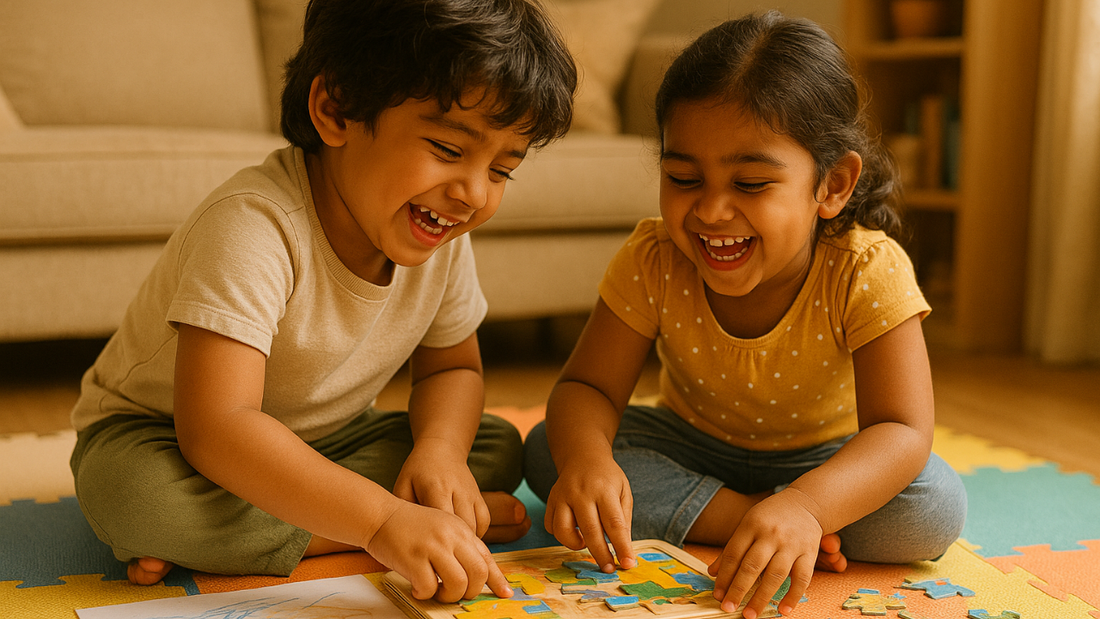
Sibling Play Harmony: Encouraging Positive Sibling Interactions
LiLLBUDFor parents, observing siblings playing together is a heartwarming reminder of why you wanted them to have each other in the first place. But let's face it—along with giggles and hugs, there are also power struggles, toy wars, and sometimes tears. The good news? Positive sibling relationships can be fostered, encouraged, and even developed into lifelong friendship skills.
Why Sibling Play Matters
Siblings can develop their:
- Problem-solving and teamwork skills are developed by playing together.
- By being aware of one another's emotions, you can demonstrate empathy.
- Learn to be patient and compromise in a safe setting.
- Strengthen their bond through shared experiences.
Cooperating and having fun isn’t just about getting along—it’s a chance for them to develop valuable social and emotional skills that will stick with them for life.
1. Choose Activities That Promote Teamwork
Activities and games in which children must work toward a common goal are the best.
- Build-a-Fort Challenge: It involves making a comfortable hiding place out of chairs, blankets, and pillows.
- Treasure Hunt: For this, you can hide a few objects and create some clues. Ask them to solve clues together.
- Joint Art Projects: One person adds details while the other paints the background.
These activities naturally promote children to communicate and solve problems together.
2. Teach Turn-Taking Early
Turn-taking is the foundation of peaceful play. For younger children, begin with brief turns and definite cues such as, "Your turn to roll the dice." Utilize timers on games that may awaken competition; it keeps things level without Mom and Dad refereeing every time.
3. Celebrate Cooperation, Not Competition
While friendly competition can be fun, but it can also escalate really fast. Try switching it up by introducing games where everyone wins together. Such as:
Friendly competition can be entertaining, but it can also get out of hand very fast. Introduce games where everyone wins together to change things up. For instance:
- Building a tower as high as possible without it collapsing.
- Finishing a puzzle as a team.
-
Cooking or baking something where each child has a role.
4. Give Each Child a Role
Conflicts can occasionally occur when one child feels excluded. Assigning roles helps ensure that everyone has an important part, like “builder” and “decorator” during block play or “leader” and “navigator” in an indoor adventure.
5. Model Positive Interaction
Children love to imitate what they see around themselves. They are more likely to follow your example when they observe you speaking calmly, sharing, and taking turns; they also try to model the same. Narrate your actions: “I’m passing you the scissors so you can have a turn. It's my turn to cut now.
6. Give Them Space to Sort It Out
Not every disagreement needs a parent to step in. Give siblings room to work out small conflicts between themselves, as it serves to develop negotiation skills. You have to only step in if safety or kindness is at stake.
7. Create Rituals for Connection
Special sibling rituals, such as reading a bedtime story together, having a weekly movie night, or throwing an afternoon dance party, can create lasting positive memories.
From Squabbles to Smiles
Good sibling relationships don't occur overnight, but with the proper activities, some guidance, and a bit of patience, your children can learn to like one another most of the time. Over time, those moments filled with laughter and teamwork will far outweigh the squabbles.


2 comments
u9ucx1
u9ucx1